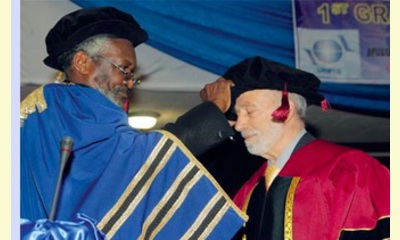|
|
Culture of Peace Tourism in Africa
un articulo por CPNN interviewer
To learn about culture of peace tourism in Africa,
we interviewed Lou D'Amore, Founder and
President of the International Institute of Peace
through Tourism. 
Dr. Patrick Kalifungwa, the Vice Chancellor of Livingstone International University of Tourism Excellence and Business Management (and former Zambian Minister of Tourism) awards an honorary degree to Lou D’ Amore
click on photo to enlarge
CPNN. Over the years CPNN has
reported on a number of conferences and
initiatives that you have helped develop in Africa,
including:
* The Fourth
African Conference on Peace through
Tourism in Kampala, Uganda in 2007;
* The 5th
IIPT African Conference in Zambia in 2011
with the first ever Indigenous Tourism Leaders
Forum;
* The Lusaka
Declaration, adopted at the Zambia
conference in 2011
* The re-dedication of IIPT Peace Park Featured
on the Opening Day of UNWTO General Assembly in
Zambia in 2013;
I guess there were other such conferences in
Africa prior to 2007.
Lou D'Amore. Yes, The first
African conference was held in Nelspruit,
Mpumalanga Province, South Africa in 2001. The
second one, in December, 2003, took place in Dar
es Salaam, Tanzania, dedicated to poverty
reduction through tourism. The third, in Lusaka,
Zambia, February, 2005, adopted a 21st Century Vision
for African Tourism. And, of course, there are
followup actions, such as "peace parks" that are
developed after each of these conferences.
CPNN. And now, as we recently
reported, you will be organizing a major symposium in South
Africa next February. Can you tell us more about
it?
Lou D'Amore. The symposium
represents the achievement of IIPT’s mission of
the past thirty years, to put sustainability and
culture of peace on the agenda of the entire
tourism industry. The symposium is dedicated to
Cultivating Sustainable and Peaceful Communities
and Nations Through Tourism, Culture and Sports,
and will be addressed by the head of the United
Nations World Tourism Organization, which
represents ministers of tourism from the entire
world, and the head of the World Travel and
Tourism Council which represents the CEO's of
the major industries of tourism such as airlines,
hotels and travel agencies. To register for the IIPT
World Symposium: Cultivating Sustainable and
Peaceful Communities and Nations through
Tourism, Culture and Sport, please visit www.iiptsymposium.com.
Early bird registration is available til Friday,
December 12.
CPNN. Are other African
countries, in addition to those mentioned here,
involved in culture of peace tourism?
Lou D'Amore. Indeed, this is
becoming a priority throughout Africa. For
example, at our recent session at the World Travel
Market, we heard speakers from Rwanda and
Tunisia, among others. The Head of Tourism and
Conservation for the Rwanda Development Board,
painted an inspiring picture of the role tourism has
played in bringing once warring communities in
Rwanda together. Rwanda’s new program puts
five percent of tourism revenue back into the local
economies and building schools, health clinics,
social programs, and contributing generally to
socio-economic development. As she said, “It
takes leadership that understands that you need
to put power back into our communities and help
them understand the value of protecting wildlife…
the value of tourism. No peace, no tourism.”
|








|
DISCUSSION
Pregunta(s) relacionada(s) al artículo :
How can tourism promote a culture of peace?,
* * * * *
Comentario más reciente:
Why tourism?
Can tourism be seen as an instrument to achieve complicity between people’s minds?
“There is nothing better that connects two people’s mind than a good conversation” The above quote could be used to describe the effect which tourism has on people. Like a great conversation, tourism could be said to play a vital role amongst people all over the world. It fosters communication in all its senses, intercultural dialogue and mutual understanding.
In today’s world it is evident that there is a shortage of moral or ethical values amongst people across the different nations in this world, resulting in a globalised world lacking these morals and ethical values. Ignorance, the failure to consider the needs of others, and selfishness are a few of the ways which hinder us from embracing diversity and a common human perspective, which would result informal empathy, internal moral compassion, tolerance of differences, historical consciousness and interpretation. The above mentioned features are intrinsic, inherent and can be found in the practice of tourism.
Tourism has been emphasized as one of the most effective instruments which continue to tackle to tackle social and economical poverty, as well as encourage the culture of peace practice amongst people. In looking at the UN architecture, one is able to see the growing implications which the tourism sector has on the world and world policies. . ... continuación.

|
|









